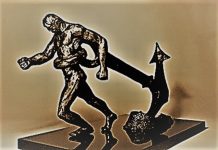 In our leadership-frenzied Christian culture, I’ve opted for a different label for leadership.
In our leadership-frenzied Christian culture, I’ve opted for a different label for leadership.
That label is influence.
Despite the unhealthy love-affair that countless Christians have with “leadership” and being “a leader,” the truth is, if you’re a follower of Jesus Christ, you’re an influencer.
Since God’s Spirit dwelling in you, you’re a member of the body of Christ, you’re a part of the believing priesthood, you’re a servant (i.e, a minister), you have influence.
That influence may be large or small, it may be good or bad, but it exists.
In this article, I want to address two types of leaders (influencers) in the body of Christ. And I’d like to do so by using an experience I had many years ago with two very different kinds of leaders.
At the time, both had considerable influence. But in terms of their character and leadership-style, they were light years apart. And so each influencer represents two very different kinds of leadership with drastically different results.
Influencer 1
The first leader was a gifted speaker and writer. He held a PhD in charm. And when he was at the top of his game, he was unparalleled in articulating certain topics about which he was passionate.
As with most gifted communicators, whenever he spoke in public, one part of the audience would descend into a “take his head off” feeding frenzy, while others who would hardly squirm, never once reaching for their smart phones.
However, this influencer suffered from a piercing narcissism to which he was completely blind. And as with most narcissistic types, he became easily jealous of others who were as gifted – or more gifted — than he.
Even during his public talks, his megalomania would betray itself as he’d wax eloquent about himself, his accomplishments, and his future plans.
Despite his outward warmness, this influencer viewed other mortals as projects to advance his own ministry rather than as people made in God’s image. He had no capacity to accept advice from others or feel the need to listen to them. Even when it would have spared him lots of failure and frustration.
While he would speak compellingly about brokenness and humility, he was routinely threatened by the popularity of others. And to compensate for his monumental insecurities, he’d often engage in petty back-biting, school-yard belittling, and even slander. These character defects made him toxic.
Because he never dealt with the insecurities that possessed his soul, he routinely projected the darkest parts of his heart onto others, recklessly (and wrongly) imputing evil motives to them. He was also quick to blame others for his own failures. And he rarely apologized to others when he made a blunder.
Today, this man’s ministry has shriveled down to nothing. Virtually all the people who once supported him bailed out long ago. And to my knowledge, he’s never come to terms with the damage he’s brought to so many. Nor has he ever repented. Instead, he continues to be fixated on his own legacy, whatever is left of it.
Infuencer 2
The second leader was the wisest and smartest man I’ve ever met. Yet one of the most humble.
He possessed amazing wit and impressed everyone he met. Especially people in ministry, including Bible scholars and theologians who would walk away awed after a conversation with him.
Whenever he spoke, in public or during informal settings, he held people spellbound. (This includes people like me, who have toddler-like attention spans.)
People left his presence enriched, encouraged, and inspired. (Taking my cue from this man, I strive to do the same.)
I learned more from him than anyone else. Yet despite his incredible gifting, he was more interested in others than in himself . Their lives, their heartaches, their joys, and their pain. Unselfishly, he made himself available to listen to them — even for hours, if need be — and offer encouragement and wise counsel.
This leader also had an uncanny ability to validate people, even the most difficult. I watched him deal with high-maintenance befuddled souls and he’d instinctively disarm their anger and emotional turbulence.
This particular man didn’t think much about his legacy. He lived in the present, and his lived-example was an offering to others. Myself included.
As to having a robust knowledge of the Lord, the Scriptures, and history, he was without peer. And so was his gift to unpack lofty insights with simple language.
Two influencers. Two very different characters and styles. Two very different results.
The first leader has virtually no influence today, except for a small handful of people who don’t know him very well.
The other leader still emits the fragrance of Jesus Christ to all who come in contact with him. And even though I’ve never once heard him talk about his legacy, it lives on in myself and others whom he touched.
10 Take Aways from these Two Types of Leaders
Here are ten take-aways I learned from observing both leaders. Since you have influence over others, I hope you’ll seek to build each of them into your own life.
- Know your own limitations. The body of Christ has many functions and gifts. You don’t have them all. So learn to rely on others who excel in those areas that you don’t. And lay down your need for control. Delegate.
- People aren’t projects or stepping stones to advance your own ministry. Learn to love and honor others for their own sake. As Paul said in Philippians 2, look out for their interests. Great leaders want others to supersede them. Insecure leaders can’t release the limelight.
- Always have peers — people who can speak into your life. If you consider yourself too “gifted” to have peers, you’re living in a dream world. One that will eventually become a nightmare. It won’t be long before the rope runs out. The first leader refused to have peers in his life. The second welcomed them.
- Never judge the motives of others. While you are free to evaluate the actions and ideas of other people, to impute intentions to their hearts simply reveals what’s in your own.
- Be quick to apologize if you’ve wronged someone. Great leaders apologize to people even when it’s not entirely their fault. Mending relationships (wherever possible) is more important to them than being right. They consistently take the high road, not just preach about it.
- Major in Matthew 7:12. If you don’t know what that text is, go read it and tattoo it on your forehead (spiritually, that is). The first leader believed the worst about others. The second leader would never speak ill of another believer. If he heard something about a Christian that was negative, he was inclined to not believe it. If he was concerned, he’d go to the person in question directly to inquire of them . . . the same thing all of us would want if the shoe was sitting on our foot. Learn to live Matthew 7:12 in all situations. It’s a description of the life of Jesus Christ when walked out in shoe leather.
- People will follow your way of life more than your words, for better or for worse. The first leader’s followers carved themselves into his image. They followed what he did, not so much what he said. Consequently, they were petty, insecure, judged the motives of others, become easily jealous, were given to one-upmanship and humiliating others, and trafficked in believing and spreading slander. Never forget: people will follow your bad traits more than your good ones.
- Own your mistakes and don’t blame God’s people. The first leader was quick to blame his failing ministry on everyone else. Blaming others and guilt-tripping them is the mark of a poor leader. Good leaders acknowledge their mistakes and take responsibility. They don’t shift blame or make excuses.
- Don’t overpromise and under-deliver. The first leader would often share impressive ideas, plans, and goals. He was superb at bluster. But he’d rarely follow through to the end, which eroded trust and respect. Never say things just to impress people. Make good on what you promise. Deliver.
- Forget about leading others; make serving them your business. The first leader was more interested in leading than serving. The second leader never talked about “leadership” nor did he seem to view himself as a “leader.” He was too occupied with serving. So bury your penchant for wanting to lead. Excel at serving.
Frank Viola is the best-selling author of God’s Favorite Place on Earth, From Eternity to Here, Jesus Manifesto (with Leonard Sweet) and The Day I Met Jesus (with Mary DeMuth). You can get his eBook, Discipleship in Crisis, completely FREE here.








































